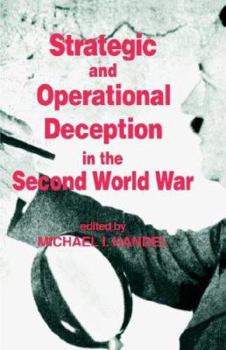Strategic and Operational Deception in the Second World War
(Part of the Studies in Intelligence Series)
Select Format
Select Condition 
Book Overview
First Published in 1987. New information obtained from the declassification of Ultra intercepts and other Second World War documents as well as from recent scholarly research has credited Allied deception operations with an even more important contribution to winning the war than was previously supposed. Yet deception is only one factor in the achievement of victory; it cannot guarantee success. It must be fully understood and exploited by the highest levels of command. Most histories of deception operations during the Second World War have focused on those that were successful. Instances in which deception operations failed to achieve their objectives are discussed by John Campbell, who describes an early attempt to convince the Germans that the Allies intended to invade at Pas de Calais in the summer of 1943, and by Katherine Herbig, who gives the first detailed description of US deception operations in the Pacific. Klaus-Jurgen Moiier questions the actual effectiveness of deception operations against the Germans. He argues that many successes attributed to the Allies' use of deception were in fact achieved by independent considerations on the German side. Professor Moiier builds a particularly strong case in challenging the success of Operation Fortitude North, in which the Allies tried to divert German troops to Norway before invading Normandy. Although very little is known of Soviet deception operations on the Eastern Front, it must be remembered that they were conducted on a much larger scale than those of either the British in Europe or the Americans in the Pacific. Colonel David Glantz's account of Soviet deception and covert activities offers a version of the historiography of the war between the USSR and Germany which may explain some of the monumental German failures. Tom Cubbage not only contributes a synthesis of the primary and secondary sources available on the deception operations preceding Overlord, but also reviews the so-called Hesketh Report - Fortitude: A History of Strategic Decep-tion in North Western Europe April 1943 to May 1945, Colonel Roger Hesketh's official report on Allied deception operations against the Germans in north-west Europe which was declassified in 1976, yet remains unpublished. It indicates that Professor Muller's suspicions that the Allies over-estimated the impact of Forti-tude are unfounded. Edited and with a comprehensive introduction by Michael Handel, these important and original studies put the entire deception effort during the Second World War into a more balanced and accurate perspective.
Format:Paperback
Language:English
ISBN:0714640565
ISBN13:9780714640563
Release Date:September 1987
Publisher:Routledge
Length:360 Pages
Weight:1.32 lbs.
Dimensions:0.9" x 5.6" x 8.5"
Customer Reviews
2 ratings
An essential analysis of how and why deception worked
Published by Thriftbooks.com User , 22 years ago
There are four essential accounts of the deception operations of World War II: this is one of them. ...What distinguishes these volumes from other accounts of deception in World War II is their analysis of the continuous evolution of the deception process. That is, they go beyond simply detailing the historical facts of deception operations to explain how the deception planners adjusted and adapted their deception operations throughout the war based on their successes and failures in fooling their Nazi enemy. Basically, the Americans and British succeeded in convincing the Nazis throughout the war that they were far stronger than they truly were, while the Russians continually fooled the Nazis into thinking they were far weaker than was the fact. What is also both remarkable and significant is that, up to 1941, the Nazis were masters of strategic and operational deception, having fooled the Poles, Czechs, British, French, and Russians about German intentions and capabilities, and achieving overwhelming surprise in the blitzkrieg invasions of Poland (1939), Norway, Denmark, Holland, Belgium, France (1940), and Russia (1941, while feinting an invasion of Britain). Being a world-class deceiver did not allow Hitler to see through the deceptions that were skillfully practiced against him."Strategic and Operational Deception in the Second World War" is based on papers delivered at an international conference on "Intelligence and Military Operations" held at the U.S. Army War College, Carlisle, PA in 1986. Like all works edited or written by the late Professor Handel, formerly of the Army War College and the Naval War College, this collection is thoroughly researched, with soundly founded historical judgments, prepared by leading historians and analysts of twentieth century deception, including David Glantz, Katherine Herbig, Klaus-Jürgen Müller, and John P. Campbell. Particularly interesting is Klaus-Jürgen Müller's revisionist account, "A German perspective on Allied deception operations in the Second World War," that dismisses Allied deceptions as having any impact on German defenses. Michael Handel's "Introduction" effectively demolishes Müller's arguments in detail and routs the general thesis that Allied deceptions had no impact on German decisions and operations.
Useful Studies
Published by Thriftbooks.com User , 23 years ago
This is a collection of case studies and essays on the uses of deception. It consists of papers from a series of international conferences held at Carlisle, Pa. Like all works monitored or written by this compiler, a professor at the Army War College, it is thoroughly researched and full of sound judgements prepared by many of the leading scholars of twentieth century intelligence history. Frank Cass, the publisher is noted for quality studies produced for the specialist and scholar. The volume was originally a special issue of the journal Intelligence and National Security. It is intended as part of a series of thematic texts.Belongs on the shelf of every serious researcher of the uses of intelligence.






